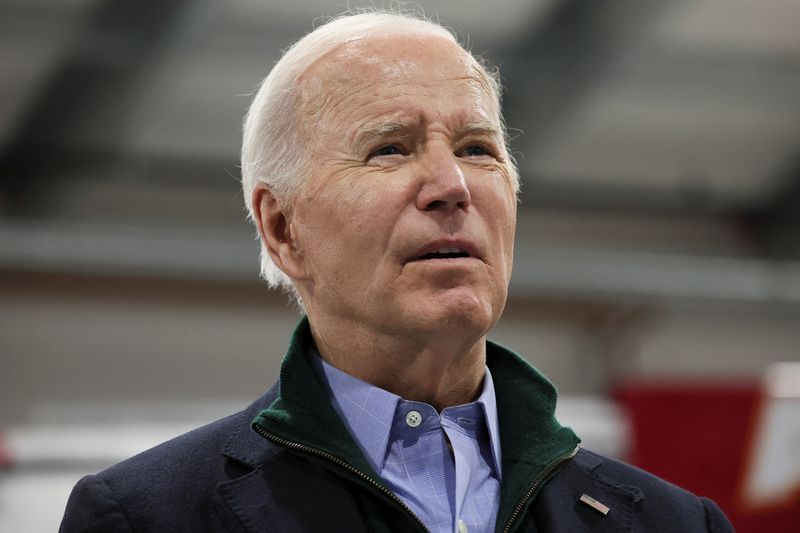By Steve Holland, Nandita Bose and Trevor Hunnicutt
WASHINGTON (Reuters) -U.S. President Joe Biden said on Saturday the United States does not support the independence of Taiwan, after Taiwanese voters rebuffed China and gave the ruling party a third presidential term.
Earlier in the day, the Taiwanese ruling Democratic Progressive Party's (DPP) presidential candidate Lai Ching-te came to power, strongly rejecting Chinese pressure to spurn him, and pledged both to stand up to Beijing and seek talks.
"We do not support independence..." Biden said, when asked for reaction to Saturday's elections.
The United States switched diplomatic recognition from Taipei to Beijing in 1979 and has long said it does not support a formal declaration of independence by Taiwan. It does, however, maintain unofficial relations with the self-governed island and remains its most important backer and arms supplier.
Beijing, which has never renounced the use of force to bring Taiwan under its control, fears that Lai could declare the establishment of a Republic of Taiwan, which Lai has said he will not do.
Biden has previously upset the Chinese government with comments that appeared to suggest the United States would defend the island if it were attacked, a deviation from a long-held U.S. position of "strategic ambiguity".
His comments on Saturday appear to be an effort to reassure Beijing.
Even so, Washington warned just hours ahead of the polls opening that "it would be unacceptable" for "any" country to interfere in the election.
Taiwan, which neighboring China claims as its own, has been a democratic success story since holding its first direct presidential election in 1996, the culmination of decades of struggle against authoritarian rule and martial law.
U.S. Secretary of State Antony Blinken congratulated Lai Ching-te on his victory and said the United States "is committed to maintaining cross-strait peace and stability, and the peaceful resolution of differences, free from coercion and pressure."He said the U.S. looks forward to working with Lai and leaders of all parties in Taiwan to advance their "longstanding unofficial relationship, consistent with the U.S. one China policy."
The Biden administration has feared that the election, transition and new administration would escalate conflict with Beijing.
Biden has worked to smooth relations with China, including agreeing to talk through differences on security matters at a California summit with President Xi Jinping in November.
Taiwan's government expects China to attempt to put pressure on its incoming president after the vote, including staging military maneuvers near the island this spring, two senior government officials said. China has never renounced the use of force to bring Taiwan under its control.
In a show of support for the government, Biden plans to dispatch an unofficial delegation to the self-governed island, according to a senior Biden administration official.

The delegation is likely to include some former high-ranking American officials, according to the official, who said the names have not been finalized. Similar delegations have been sent to Taiwan in the past.
China was angered in 2016 when then-President-elect Donald Trump spoke by phone with President Tsai Ing-wen of Taiwan, the first such conversation between U.S. and Taiwan leaders since President Jimmy Carter switched diplomatic recognition from Taiwan to China in 1979.